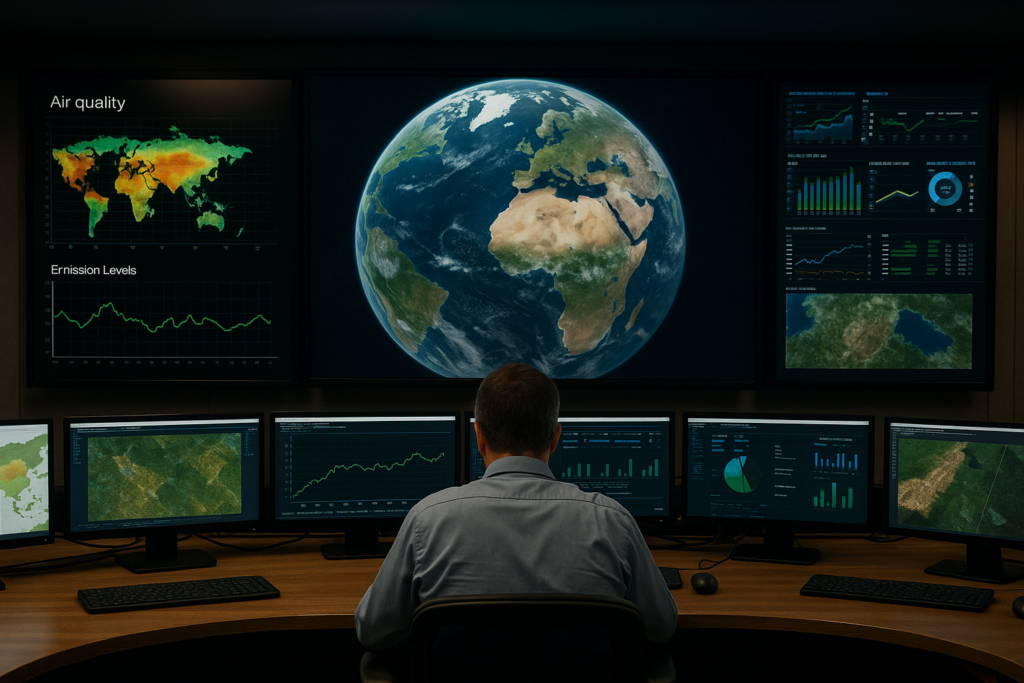Highlight 43/2025: From Transparency To Accountability – What Is The Legal Status Of Environmental Data In Global Governance?
Abdulrahman Kafoud, 3 November 2025

Environmental information has become the centre of global governance. Air quality, emission inventories, the findings of inspections, satellite data, and even citizen observations all predetermine the way states develop climate policies and allow for tracking progress. However, as the data collection has grown, legal regulations about the process of verifying, interpreting, and using the information are still in disarray. Whether or not data should be transparent is no longer a question, but one wonders whether transparency is possible without fairness and accountability.
A right of access to environmental information was enshrined by the Aarhus Convention and the Escazú Agreement, connecting transparency to public participation and justice. The United Nations General Assembly has recognized the human right to a clean, healthy and sustainable environment. In United Nations human rights practice, this right is understood to depend on the procedural guarantees of access to information, public participation and access to justice. These instruments represent significant progress, yet they primarily concern disclosure rather than verification. None of them creates a universally binding cross-jurisdictional verification framework for emissions data or for assessing whether indicators fully reflect life-cycle impacts. Widely adopted technical standards exist, such as ISO 14040 and ISO 14044 for life-cycle assessment and the IPCC and UNFCCC transparency and inventory guidelines, but these function as professional and reporting systems rather than a single global legal verification mechanism. Consequently, voluntary reporting and uneven metrics can displace robust environmental transparency, leaving room for selective interpretation or political misconduct.
This dilemma has been intensified by technological innovation. Artificial intelligence, drones, and satellite systems now provide almost real-time observations of pollution and deforestation. The application of such tools can enhance credibility provided that it is done on an equal playing field, although it raises new legal and ethical questions, including the admissibility of AI-generated detections as legal evidence. In the absence of clear international leadership, technology will likely contribute to widening the disparity between states that possess advanced monitoring capabilities and those that rely on external data sources.
Transparency should be accompanied by accountability. States are increasingly required by governance frameworks to establish reporting systems that ensure transparency and proportionality in environmental disclosure, while private operators are subject to regulations obliging them to provide data that is accurate, reliable, and transparent. Manipulation or concealment should be met with proportionate consequences, while honest disclosure should be rewarded. A governance framework that relies solely on transparency, without mechanisms for fairness, verification, and accountability, risks turning environmental data into a weapon of blame, an instrument that can be used to harm others. In contrast, a framework grounded in fairness transforms transparency into a platform for cooperation.
An effective way forward would be to integrate open principles of data with standardised data verification and incentive-based compliance. By creating a UN Environmental Data Verification and Fairness Body, which would report to the UN Environment Assembly, it could harmonize verification approaches, confirm AI-driven evidence, and acknowledge approved contributions to global emissions reduction. This would make fairness a political ideal and a legal standard of transparency in environmental governance.
Finally, environmental governance needs to shift from merely tallying emissions to fostering responsibility. Once environmental information becomes a common language of trust through transparency, verification, and accurate interpretation, the gap between disclosure and accountability can be narrowed, allowing information to evolve into genuine community development. Global progress depends not only on unveiling the sources of pollution but also on recognizing those who actively work to reduce it.
Abdulrahman Kafoud, Highlight 43/2025: From Transparency To Accountability – What Is The Legal Status Of Environmental Data In Global Governance?, 3 November 2025, available at www.meig.ch
The views expressed in the MEIG Highlights are personal to the authors and neither reflect the positions of the MEIG Programme nor those of the University of Geneva.
